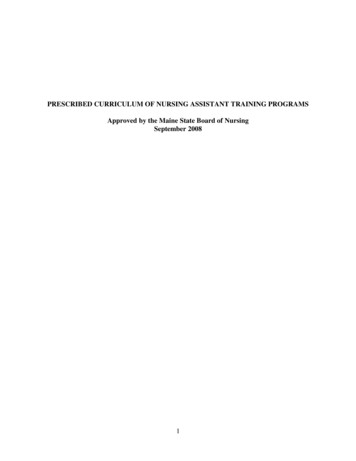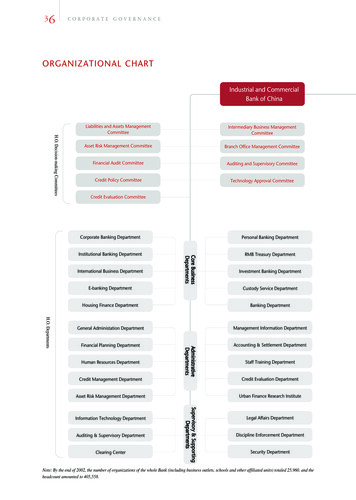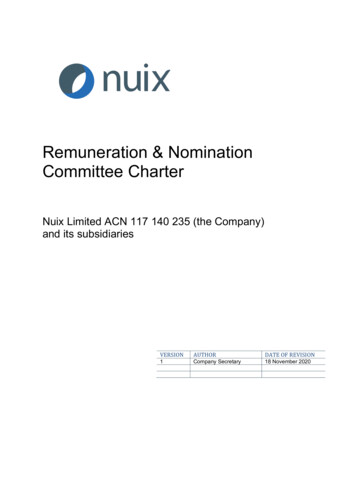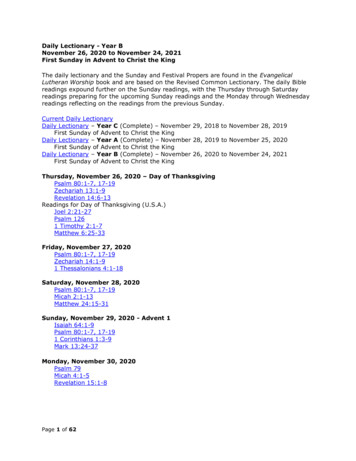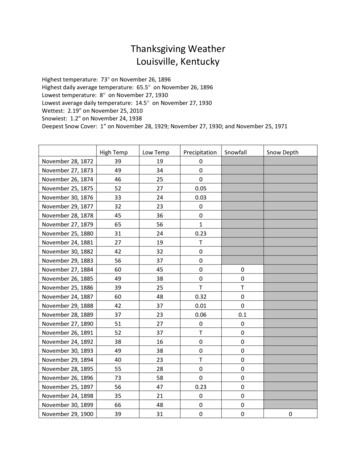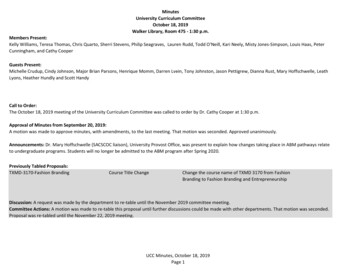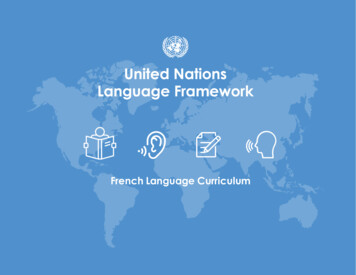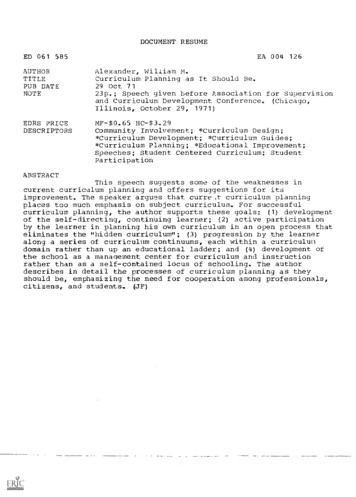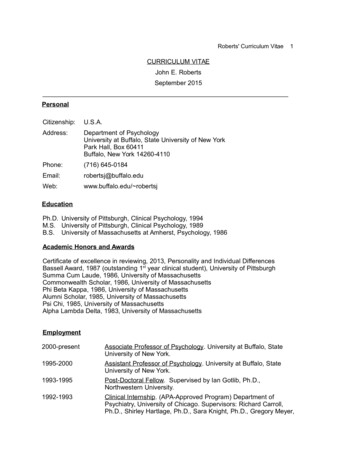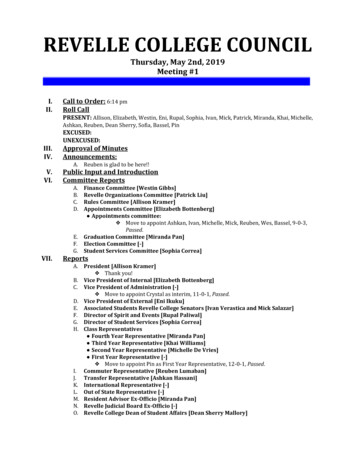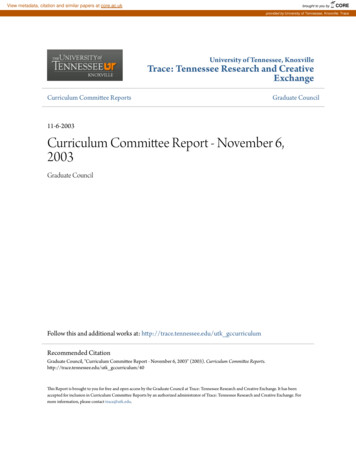
Transcription
View metadata, citation and similar papers at core.ac.ukbrought to you byCOREprovided by University of Tennessee, Knoxville: TraceUniversity of Tennessee, KnoxvilleTrace: Tennessee Research and CreativeExchangeCurriculum Committee ReportsGraduate Council11-6-2003Curriculum Committee Report - November 6,2003Graduate CouncilFollow this and additional works at: http://trace.tennessee.edu/utk gccurriculumRecommended CitationGraduate Council, "Curriculum Committee Report - November 6, 2003" (2003). Curriculum Committee Reports.http://trace.tennessee.edu/utk gccurriculum/40This Report is brought to you for free and open access by the Graduate Council at Trace: Tennessee Research and Creative Exchange. It has beenaccepted for inclusion in Curriculum Committee Reports by an authorized administrator of Trace: Tennessee Research and Creative Exchange. Formore information, please contact trace@utk.edu.
GRADUATE COUNCILCURRICULUM COMMITTEENOVEMBER 6, 20034th Floor Conference Room, Andy Holt Tower3:30 P.M.Attending: Paul Frymier (Chair), Stephen Blackwell, Sherry Cable, Sid Collins,Mary McAlpin, Naima Moustaid-Moussa, Blanche O’Bannon, Brenda Rayman,Kay Reed, Lloyd Rinehart, Bobbie Suttles. Representatives from the collegespresent were Tom George and Schuyler Huck, College of Education, Health andHuman Sciences; Jan Lee, College of Nursing; and Luther Wilhelm, College ofEngineering.Dr. Paul Frymier called the meeting to order at 3:30 p.m.Curricular Proposals recommended by committee for approval by GraduateCouncil: Education, Health, & Human Sciences:Child & Family Studies: Revise Ph.D. Program in HumanEcology, concentration Child & Family Studies; revise, drop andadd courses.Education: Drop One Course—Trans College Seminar.Educational Administration & Policy Studies: Add cross-listedcourse (primary department is Educational Psychology).Educational Psychology & Counseling: Revise Ph.D. Programin Education, Counselor Education concentration by decreasingcore requirements by 1 hour.o Counselor Education Subject Area: Revise 2 courses;Add 1 course.o Educational Psychology: Add 3 courses (2 werepreviously offered under ITES).Instructional Technology & Educational Studies: ReviseCatalog to include list of specializations.
o Curriculum, Educational Research & EvaluationSubject Area: Drop 2 courses (these are moving to theEducational Psychology Department).Sport & Leisure Studies: Revise M.S. in Recreation & LeisureStudies with a concentration in Recreation Administration to changetitle and program of concentration to Recreation & LeisureAdministration; Revise M.S. in Sport Studies major with aconcentration in Sport Studies to drop culminating experiencerequirement for non-thesis students.o Recreation & Leisure Studies Subject Area: Revise 1course.o Sport Studies Subject Area: Revise 3 courses; Drop 1course.Theory & Practice in Teacher Education: Revise Ed.D.requirements statement concerning full-time enrollment; Reviseseminar courses;Add 1 course. Nursing:For the Ph.D. program: Revise admission and programrequirements and .Revise Course title and catalog description for one course; Droptwo courses.M.S.N. program: Revise admission requirements.Add RN-M.S.N. track. Social Work--Information only: Change statement on ExtendedStudy. Courses Not Taught in Four or More Years to be dropped Fall2004.The meeting adjourned at 5:20 P.M.
MemoTo:Graduate CouncilFrom: Tom George, College of Education, Health & Human SciencesDate: 11/14/2003Re:Items for the Graduate Council Agenda from CEHHSThe attached curricular proposals have been approved by the faculty of the College ofEducation, Health & Human Sciences and are submitted to the Graduate Council forconsideration. The following is a summary of these proposals: Child & Family Studies: Revise Ph.D. Program; *Revise one course; Drop3 courses; Add 3 courses. (*Instead of revising CFS 571, it is to be droppedand CFS 572 added.) Education: Drop One Course. Ed Admin & Policy Studies: Add cross-listed course (primary departmentis Educational Psychology). Educational Psychology & Counseling: Revise Program.Counselor Education Subject Area: Revise 2 courses; Add 1course.Educational Psychology: Add 3 courses (2 were previouslyoffered under ITES). Instructional Technology & Educational Studies: Revise CatalogCurriculum, Educational Research & Evaluation SubjectArea: Drop 2 courses (these are moving to the EducationalPsychology Department). Sport & Leisure Studies: Revise Rec & Lesiure St concentration title andprogram; Revise Sport & Leisure Studies program.Recreation & Leisure Studies Subject Area: Revise 1 course.Sport Studies Subject Area: Revise 3 courses; Drop 1 course. Theory & Practice in Teacher Education: Revise catalog; Revise courses;Add 1 course.Please contact me at 974-0818 if you have any questions or need additional information.Thank you.
COLLEGE OF EDUCATION, HEALTH, & HUMAN SCIENCESCHILD & FAMILY STUDIES DEPARTMENTREVISE Ph.D. in Human Ecology – Child and Family Studies concentrationOn page 71 of the 2003-2004 Graduate Catalog, revise the Ph.D. Program description and requirements:From:The department supports a doctoral program leading to a Ph.D. in Human Ecology. Two themes arehighlighted: the integration of human development and family studies and concentration in a selectedarea of study. A doctoral program that is concurrently specialized and integrative in nature reflectsthe complexity of the disciplinary subject matter, provides a broader context to formulate theoreticalquestions, and broadens the empirical literature for addressing these questions.Requirements include:1. Completion of the foundation courses in the Master’s program: 510, 511, 550, and 570.2. Completion of the doctoral core: 640, 634, 691 or 650.3. Minimum of 21 credits of additional coursework in Child and Family Studies.4. Statistics 532 or Statistics 538 or Social Work 660.5. Three credits of advanced statistics.6. Minimum 3 credits in specialized research methods.7. Selection of one of the following specializations: teaching in higher education (requires UT GTAseminar, 3 credits of college teaching methods and one semester of supervised teachingexperiences); administration in community services (requires 566 or 563, 521 or SW 541, andone semester of an administrative apprenticeship); research emphasis requires 6 additionalcredits in research methods or statistics).8. Minimum of 6 credits in a cognate area.9. Minimum of 24 credits of 600.10. Minimum of 96 credits beyond the bachelor’s degree.To:The department supports a doctoral program leading to a Ph.D. in Human Ecology. Two themes arehighlighted: the integration of human development and family studies and concentration in a selectedarea of study. A doctoral program that is concurrently specialized and integrative in nature reflectsthe complexity of the disciplinary subject matter, provides a broader context to formulate theoreticalquestions, and broadens the empirical literature for addressing these questions. The Ph.D. isprimarily a research degree. A core component of the program focuses on the development ofexpertise in research methods and statistics so that graduate students are capable of advancingknowledge in their field of study.Requirements include:1. Completion of the foundation courses in the Master’s program: 510, 511, 550, and 570.2. Completion of the doctoral core: 640 and 634.3. Minimum of 18 credits of additional coursework in Child and Family Studies.4. Statistics 538 or Social Work 660.5. Three credits of advanced statistics.6. Complete six credits of supervised research practica, CFS 680 and 681.7. Complete three credits of either CFS 633 or CFS 660; and complete three credits from amongCFS 633, CFS 660, CFS 650, CFS 670, or CFS 691 for a total of 6 credits of doctoral level CFSresearch methods.8. Minimum 3 credits in specialized research methods.9. Completion of 2 credits of CFS 572.10. Minimum of 6 credits in a cognate area.11. Minimum of 24 credits of 600.12. Minimum of 95 credits beyond the bachelor’s degree.Effective: Fall 2004Rationale: Program changes are needed to give the Ph.D. an increased emphasis onresearch and research methods. Of particular importance is the need to encompassresearch methods used in both child and family studies and to ensure that all students areexposed to the predominant methods used in child and family studies research. Theteaching and administration specializations were eliminated so that we could re-emphasizethat disciplinary research methods are at the core of a research-intensive university.
Faculty will continue to mentor students who assume teaching responsibilities within thedepartment as part of an assistantship experience or as an elective option.Impact on other academic units: The changes proposed here will impact on otheracademic units by making a broader spectrum of methodology courses available toqualified students in other programs across the university.Financial impact: Existing faculty as part of their normal teaching load will teach theproposed new courses. Hence, the proposed changes will have no financial impact onfaculty costs.Child and Family Studies (245)DROP571 Research Seminar (1) Presentation and critique of research projects. Prereq: Departmentalmajor or consent of instructor. May be repeated. S/NC only.ADD572 Professional Socialization (2) Behaviors and practices appropriate to a professionalresearcher and practitioner in the field of Child and Family Studies: understanding and workingwithin the university environment, maintaining ethical standards, complying with human subjectsprotocols, making public presentations, and networking with peers.EQUIVALENCY TABLEFormer Course to be Dropped Fall 2004Child and Family Studies 571 (1)Equivalent Course to be Added Fall 2004Child and Family Studies 572 (2)Effective: Fall 2004Rationale: Understanding the demands and expectations of a professional academicenvironment enhances graduate students’ success as students and later as professionals.In the past, the department has made no pointed effort to help students gain thisperspective. As a result, some learned, others did not, and their academic performancemay have suffered. This course is a concerted effort to expose students to the culture andresponsibilities of professional researchers and practitioners in the Child and FamilyStudies field in the hopes of enhancing their academic performance and better preparingthem for the post-graduate, professional world.Relationship of the course to other courses/programs: The only other comparablecourse that we have identified is PSYCH 635: Ethical, Legal and Professional Issues inPsychology. There will be some overlap between these classes in that both will addressethical and professional issues. However, the Psychology course will focus heavily on theimpact of these issues when working as a Clinical Psychologist. Our students are nottraining or planning to be Psychologists or to provide clinical services. Rather they will beemployed in academic settings or in settings that design and provide services for childrenand families. Thus, while there will be some overlap, the Psychology course will focus tooheavily on issues related to the practice of Clinical Psychology which minimize theeducational benefit for our students.DROP535555625Child and Family Policy (3)Children, Divorce, and Remarriage (3)College Teaching and Professional Roles in Human Ecology (3)Effective: Fall 2004Rationale: The courses are being dropped for one or more of the following reasons: doesnot contribute to the revised direction of the department’s graduate program, streamlinescourse offerings, the faculty member who taught the course is no longer here, not aninterest of current faculty, want to achieve a complement of elective courses that can beoffered on a regular basis and these course do not fit that objective, eliminate courses thathave not been taught for several years and for which there are no plans to offer in the nearfuture.
ADD660 Experimental Design and Observation Methods (3) Experimental and quasi-experimental designs(group and time-series single-case) in natural and contrived settings as used in child and family research;observation methods used with these designs. Prereq: 570.Effective: Fall 2004Rationale: The most widely used methods in child and family research are observational,experimental, and survey. Experimental and observational methods are most typicallyused in child related research. The department currently has no course offerings inexperimental and observational methods. The addition of this course will enable thedepartment to provide training in this area at an advanced level and better prepare ourstudents for employment in research institutions and other professional settings.Relationship of the course to other courses/programs: Some of the same quasiexperimental and experimental designs are addressed in EP 505. However, that course isdesigned to address the needs of students who will be working in appliedpsychoeducational research and focuses very heavily on single-case designs used inclassroom settings. Our doctoral students require a course that is more broadly basedacross the experimental designs used in the child and family fields. In addition, EP 505does not present much information on observation methods.Format of course including location: The course will consist of lectures, in-classdiscussion, presentations by researchers inside of and outside of the department, and indepth investigation of selected areas of research within the field where the use of a rangeof designs and measurement methods is notable.Financial impact : None. Current faculty as part of their normal teaching load will staff thecourse. Practice observations will be conducted in settings that already exist.ADD680-681 Knox Area Family and Child Study (KAFACS) Research Practica I, II (3, 3) Faculty-directedcollaborative original research, including problem definition, instrumentation, data collection, data analysis, andreport writing on a panel or sample of families and children in the Knox County area. Two semesters, 3 creditsper semester. Prereq: 570.Effective: Fall 2004Rationale: In this department, students currently have limited opportunity to conducthands-on, faculty-directed collaborative research. The purpose of this course is to providesuch hands-on involvement in research that can integrate research experience withprevious course work on research methods. The addition of such a course enhancesstudents' professional training and employment opportunities. In addition, the course willprovide the department with a research-grounded link to the community, through which wecan provide insight and understanding of on-going problems—the mission of a land-grantinstitution. The addition of this course will provide research training in a collaborativeenvironment, an opportunity to learn about child and family issues in the larger KnoxCounty area, data and recommendations for addressing such issues, and the generation ofpilot data faculty can use to generate external funding for further research projects.Relationship of the course to other courses/programs: This course does not duplicateother courses or programs. Students from other programs may enroll in the proposedclass.Format of course including location: The on-campus portion of the course will includelectures, discussion groups, research design groups, and work in the computer labs fordata analysis. Off-campus, course participants will be involved with participating agenciesand families explaining the research, gathering data, and reporting the results.Financial impact: No new faculty would need to be hired to direct this course. Space tohouse several research associates with appropriate computer equipment has already beenallocated internally within the department.
Education (289)DROP601 Trans-College Seminar (1)Effective: Fall 2004Rationale: As doctoral programs are managed at the department level, this course is no longerapplicable. It will be replaced with departmental seminars.EDUCATIONAL ADMINISTRATION AND POLICY STUDIES DEPARTMENTEducational Administration And Policy Studies (288)ADD AND CROSS-LIST577 Educational Statistics (3) Same as Educational Psychology 577. (Primary course is EducationalPsychology 577.)Formerly: Curriculum, Educational Research, and Evaluation 561.Effective: Fall 2004Rationale: Course was previously offered in the Department of Instructional Technology andEducational Studies (Curriculum, Educational Research, and Evaluation 561). Due to the retirementof the primary instructor for the course, the Department no longer wishes to offer it and has agreed toallow the course to be moved to the Department of Educational Psychology and Counseling.Relationship to other courses/programs: The course will be cross-listed with EducationalPsychology 577 (primary).Financial Impact: None. The professors who will teach the course will have their normal teachingschedules adjusted so they can offer this course.EDUCATIONAL PSYCHOLOGY AND COUNSELING DEPARTMENTREVISE PH.D.PROGRAM – EDUCATION MAJOR – COUNSELOR EDUCATION CONCENTRATIONOn page 94 of the 2003-2004 Graduate Catalog, revise the Ph.D. in Education with concentration in CounselorEducation as follows:From: Specialization 9 Hours (Not Counselor Education) Cognate 6 Hours Core 11 HoursSeminar in Primary Concentration:COUN 650 (3 Hours): Seminar in Counselor EducationPhilosophy of Science (3 Hours) (substitute COUN 535 Ethical, Legal, and ProfessionalIssues in Counseling)Theoretical Foundations and/or Applications (3 Hours)Trans college Seminar (2 Hours) Research 15 Hours9 Hours Quantitative Research including a two- semester statistics sequence6 Hours Qualitative Research Dissertation 24 Hours Total 98 HoursTo: Specialization 9 Hours (Not Counselor Education) Cognate 6 Hours Core 10 HoursSeminar in Primary Concentration:COUN 650 (3 Hours): Seminar in Counselor EducationPhilosophy of Science (3 Hours) (substitute COUN 535 Ethical, Legal, and ProfessionalIssues in Counseling)Theoretical Foundations and/or Applications (3 Hours)
Department Seminar (1 Hour) Research 15 Hours9 Hours Quantitative Research including a two-semester statistics sequence6 Hours Qualitative Research Dissertation 24 Hours Total 97 HoursEffective: Fall 2004Rationale: There is no longer a Trans-College seminar. Instead, the department will offer a 1 hourdepartmental seminar.Impact on other units: NoneFinancial impact: NoneCounselor Education (255)REVISE COURSE TITLETo:550 Foundations in School Counseling (3)Formerly: Introduction to Pupil Personnel Service Program (3)Effective: Fall 2004Rationale: Language of profession has changed. The State of Tennessee issues licenses forProfessional School Counselors and this revision concurs with State licensing languageREVISE GRADING & REPETITIONTo:650 Seminar in Counselor Education (3) Professional issues related to role and function of Counseloreducator. Prereq: Admission to doctoral program in counselor education.Formerly: May be repeated. Maximum 2 hours. S/NCEffective: Fall 2004ADD679 Internship in Counselor Education (1-6) Supervised experience in departmentally approved counseling,teaching, supervision, or consultation internship sites. Prereq: Admission to counselor education doctoralprogram and consent of the instructor. May be repeated. Maximum 12 hours. Satisfactory/No Credit only.Effective: Fall 2004Rationale: During our reorganization, we inadvertently left out our 679 course (on page 90 of the2002-2003 Graduate Catalog). The course is necessary to our program and needs to be reinstated.Relationship to other programs: NoneFormat: Internship (experience at internship sites) Classroom space will not be needed.Financial Impact: None. This is a course already counted in the program offerings.Educational Psychology (310)ADD & CROSS-LIST577 Educational Statistics (3) Applications of descriptive and inferential statistics to educational andinstructional problems. Use of Internet sites and computer programs to analyze data. Prereq: One yearof college mathematics, an elementary course in statistics, or consent of instructor. (Same as EducationalAdministration and Policy Studies 577.)Formerly: Curriculum, Educational Research, and Evaluation 561.Effective: Fall 2004
Rationale: Course was previously offered in the Department of Instructional Technology andEducational Studies (Curriculum, Educational Research, and Evaluation 561). Due to the retirementof the primary instructor for the course, the department no longer wishes to offer it and has agreed toallow the course to be moved to the Department of Educational Psychology and Counseling.Relationship to other courses/programs: Educational Psychology 577 is the primary course. Thecourse will be cross-listed with Educational Administration and Policy Studies 577.Financial Impact: None. The professors who will teach the course will have their normal teachingschedules adjusted so they can offer this course.ADD677 Advanced Educational Statistics (3) Applications of parametric and nonparametric statistical inferenceto educational and instructional problems. Use of computer programs and internet sites in analyzing data.Prereq: 577.Formerly: Curriculum, Educational Research, and Evaluation 671Effective: Fall 2004Rationale: was previously offered in the Department of Instructional Technology and EducationalStudies Course (Curriculum, Educational Research, and Evaluation 671). Due to the retirement ofthe primary instructor for the course, the department no longer wishes to offer it and has agreed toallow the course to be moved to the Department of Educational Psychology and Counseling.Relationship to other courses/programs: NoneFinancial Impact: None. The professors who will teach the course will have theirnormal teaching schedules adjusted so they can offer this course.ADD601 Professional Seminar (1) An introduction to doctoral study in Educational Psychology and Counselingthat explores research requirements, the meaning of scholarship in academe, resources, survival strategies forstudents, and related topics. Prereq: Admission to the Ph.D. program. May not be used to meet theEducational Psychology and Counseling 600 requirement. Satisfactory/No Credit grading only.Effective: Fall 2004Rationale: This course will be offered each fall semester for entering doctoral students in theDepartment of Educational Psychology and Counseling in order to introduce them to doctoral study inthe Department and the University. Expectations of doctoral students, the meaning of a terminaldegree, and related topics will be explored in order to prepare students to make the most of thisacademic experience.Relationship of the course to other courses/programs: This course will be taken during the firstsemester of doctoral work to provide the student with a foundation for doctoral study. Topics coveredin this seminar are not covered elsewhere in the curriculum.Format of course including location: The seminar will meet weekly and will include speakers,discussions, panels, and opportunities for reflection.Financial impact: None. This course will be taught by faculty who are transitioning from theundergraduate Human Service major which will be phased out in 2004.CATALOG CORRECTION:On page 87 of the 2003-2004 Graduate Catalog, correct the list of concentrations (Ph.D. in Education) to include thespecializations on page 128 under the Cultural Studies of Educational Foundations Concentration:From:Cultural Studies of Educational FoundationsTo:Cultural Studies of Educational Foundations (Philosophy of Ed, CulturalStudies, Sociology of Ed, and History of Ed)
Effective: Fall 2004Rationale: Specializations were left out of the catalog last year. They appear on page 128 but noton page 87.INSTRUCTIONAL TECHNOLOGY AND EDUCATIONAL STUDIES DEPARTMENTCurriculum Educational Research and Evaluation (256)DROP561 Educational Statistics (3)671 Advanced Educational Statistics (3)Effective: Fall 2004Rationale: Due to the retirement of the primary instructor for the course, the Department no longer wishes tooffer it and has agreed to allow the courses to be moved to the Department of Educational Psychology andCounseling.EQUIVALENCY TABLEFormer Course to be Dropped Fall 2004Curriculum, Educational Research, and Evaluation 561Equivalent Course to be Added Fall 2004Educational Psychology 577 (Primary course. Cross-listedwith Educational Administration and Policy Studies 577.)Curriculum, Educational, Research, and Evaluation 671Educational Administration and Policy Studies 677SPORT & LEISURE STUDIES DEPARTMENTREVISE THE M.S. PROGRAM - RECREATION AND LEISURE STUDIES MAJORChange the name of the Recreation Administration concentration to: Recreation and Leisure Administrationconcentration and revise the requirements for the concentration.Revise the requirements for the Therapeutic Recreation concentration.On page 185 of the 2003-2004 Graduate Catalog, revise the Recreation & Leisure Studies programs as follows:From:Recreation and Leisure StudiesTHE MASTER'S PROGRAM Recreation Administration ConcentrationThesis OptionRecreation and Leisure Studies415 or 440, 510, 515, 540, 541Safety Education 443Sport Management 512Research MethodsStatisticsThesisTotal153333633Non-Thesis OptionRecreation and Leisure Studies415 or 440, 510, 515, 540, 541,590Safety Education 443Sport Management 512Research MethodsStatisticsElectiveTotal213333333
Therapeutic Recreation ConcentrationThesis OptionRecreation and Leisure Studies420 or 425, 510, 515, 520, 521,522Research esis OptionRecreation and Leisure Studies420 or 425, 510, 515, 520, 521, 522Research :Recreation and Leisure StudiesTHE MASTER'S PROGRAM Recreation and Leisure Administration ConcentrationThesis OptionRLS 415: Development and Maintenance of Recreation and Athletic FacilitiesRLS 510: Perspectives and Trends in Service ManagementRLS 515: Philosophical and Conceptual Foundations of LeisureRLS 540: Fiscal Policies for Recreation and Sports RelatedOrganizations and FacilitiesRLS 541: Management and Operation of Recreation andSport Related FacilitiesSAFETY 443: Sports and Recreational Safety, orSPTMGT 512: Application of Legal Concepts to Sport SettingsResearch MethodsStatisticsThesisRLS 590: Graduate InternshipTotalNon-Thesis OptionRLS 415: Development and Maintenance of Recreation and Athletic FacilitiesRLS 510: Perspectives and Trends in Service ManagementRLS 515: Philosophical and Conceptual Foundations of LeisureRLS 540: Fiscal Policies for Recreation and Sports RelatedOrganizations and FacilitiesRLS 541: Management and Operation of Recreation andSport Related FacilitiesSAFETY 443: Sports and Recreational SafetySPTMGT 512: Application of Legal Concepts to Sport SettingsRLS 590: Graduate InternshipResearch MethodsStatisticsElectivesTotal Therapeutic Recreation ConcentrationThesis OptionRLS 510: Perspectives and Trends in Service ManagementRLS 515: Philosophical and Conceptual Foundations of LeisureRLS 520: Program Design and Evaluation in Therapeutic RecreationRLS 521: Facilitation Techniques in Therapeutic RecreationRLS 522: Clinical Aspects of Therapeutic RecreationRLS 590: Graduate Internship*Research MethodsStatisticsThesisTotal*Must meet national certification requirements333333336333333333363333633333633633
Non-Thesis OptionRLS 510: Perspectives and Trends in Service ManagementRLS 515: Philosophical and Conceptual Foundations of LeisureRLS 520: Program Design and Evaluation in Therapeutic RecreationRLS 521: Facilitation Techniques in Therapeutic RecreationRLS 522: Clinical Aspects of Therapeutic RecreationRLS 590: Graduate Internship*RLS 591: Directed Study in Leisure and RecreationRLS 592: Special Topics in Recreation & Leisure StudiesResearch MethodsStatisticsElectivesTotal*Must meet national certification requirements3333363, or33636Effective: Fall 2004Rationale: During the 2001-02 academic year the Recreation and Tourism Management (RTM) program washoused in the Department of Consumer Industries and Services. At that time CISM had just established acommon core of courses for all students in retail and consumer science (RCS), hotel and restaurantadministration (HRA) and RTM. When the College of Human Ecology and the College of Education mergedRTM, sport management and cultural sciences combined programs to form the department of sport and leisurestudies. Subsequently the RTM program became the Recreation and Leisure Studies (RLS) program. As such,the RLS program is no longer affiliated with CISM or any of the programs therein. Hence, we are requesting todrop all of the aforementioned CISM courses from our program.Impact on other academic units: None.Financial impact: None. The changed courses will be covered by Recreation and Leisure faculty.REVISE MASTER’S PROGRAM - SPORT STUDIES MAJOR – SPORT STUDIES CONCENTRATION (THESIS ANDNON-THESIS OPTIONS)On page 186 of the 2003-2004 Graduate Catalog, under Sport Studies, The Masters Program, Thesis and NonndThesis Options, 2 sentence should be changed as follows:From:All thesis students are required to take the Research Proposal Development course (Sport Studies595) and register for 6 hours of thesis (Sport Studies 500). Students who choose the non-thesisoption are required to take a written comprehensive examination and register for 3 hours of specialproject (Sport Studies 501).To:All thesis students are required to register for 6 hours of thesis (Sport Studies 500). Students whochoose the non-thesis option are required to take a written comprehensive examination.Effective: Fall 2004Rationale: Tennessee Higher Education Commission (THEC) has dropped its requirement thatMasters programs require a culminating experience in addition to a final comprehensive examination.Recreation and Leisure Studies (853)REVISE DESCRIPT
accepted for inclusion in Curriculum Committee Reports by an authorized administrator of Trace: Tennessee Research and Creative Exchange. For more information, please contacttrace@utk.edu. Recommended Citation Graduate Council, "Curriculum Committee Report - November 6, 2003" (2003).Curriculum Committee Reports.
